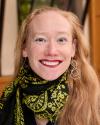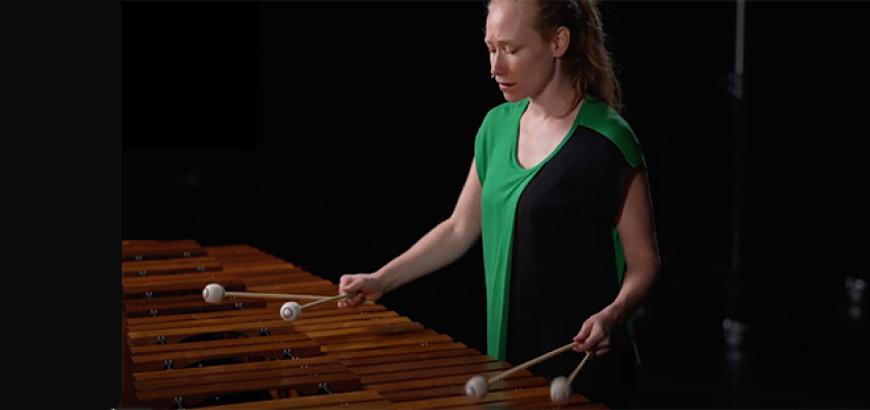Please note: This event has been postponed.
Faculty percussionist Bonnie Whiting presents Through the Eye(s), a cycle of pieces for solo speaking and singing percussionist developed in collaboration with nine incarcerated people at the Indiana Women's Prison. The program opens with Whiting's realization of faculty composer Melia Watras's graphic score, "Barking up which tree?"
Project Background
PROGRAM DETAIL
The program opens with Bonnie Whiting's realization of faculty composer Melia Watras's graphic score, "Barking up which tree?" followed by Through the Eye(s).The music and texts of Through the Eye(s) were created by the participants in a semester-long course taught by composer Eliza Brown in Fall 2019 at Indiana Women's Prison. All of the texts respond in some way to the project's collectively determined theme, "calm and storm."
PROGRAM
Barking up which tree?
Graphic score by Melia Watras, photographed by Michelle Smith-Lewis
Through the Eye(s)
1. Calm and Storm (2’)
Text by Whittney (CoCo) Bales-Malone
Music by Eliza Brown
2. Nightly Storm (4’30”)
Music and text by Ashley Strong
3. Lost in the Fog (3’30”)
Text by Marjorie Woods
Music by Eliza Brown
4. My Tunnel (3-5’)
Graphic score and text by Ingrid Swinford
5. Violent Passion (2’15”)
Music and text by Char’Dae Avery
6. Fortitude (2’15”)
Music and text by LaDawn Johnson
7. Who’s That? (4’)
Improvisatory score and text by Dawnetta Taylor (Shelton)
8. HER (3’30”)
Music and lyrics by Lara Campbell
9. Emergence (1’)
Music and text by Amaris Rose Bunyard and Joyce (Potter) Hawkins
Through The Eye(s) Project Page
Artist Bios

Bonnie Whiting (she/her) performs, commissions, and composes new experimental music for percussion. She seeks out projects involving the speaking percussionist, non-traditional notation, improvisation, and interdisciplinary performance. Her debut album, featuring an original solo-simultaneous realization of John Cage's 45' for a speaker and 27'10.554” for a percussionist, was released by Mode Records in April 2017. Her sophomore album Perishable Structures, launched by New Focus Recordings in 2020, places the speaking percussionist in the context of storytelling and features her own music as well as works by Vinko Globokar, Frederic Rzewski, Richard Logan-Greene, and Susan Parenti.
Her recent season highlights include onstage work in the multimedia chamber opera The Ritual of Breath Is the Rite to Resist, featuring productions at Lincoln Center’s Summer for the City, at The Hopkins Center at Dartmouth College, and at Stanford Live; a reprise of composer Wang Lu’s Stages for solo speaking/singing percussionist at New York’s Performance Spaces for the 21st Century (PS21); and four performances of a new concerto written for her by Jonathan Bingham with the National Symphony Orchestra for the family pops series at the Kennedy Center alongside renowned children’s book author Mo Willems. Whiting also creates original, improvised music with clarinetist James Falzone and pianist Lisa Cay Miller; their first album was released on Allos Documents in 2024, and the trio performs this season in Seattle, Vancouver, and Portland.
In 2022 she premiered Through the Eyes(s): an extractable cycle of nine pieces for speaking/singing percussionist collaboratively developed with composer Eliza Brown and ten artists and writers incarcerated at the Indiana Women’s Prison. The project was featured on NPR’s nationally-syndicated Slingshot, and locally via Seattle’s ClassicalKING radio station. Whiting has an ongoing relationship as a soloist with the National Orchestra of Turkmenistan via the U.S. Embassy Cultural Affairs Office, playing concerti in Ashgabat in 2017 and 2018. She performs frequently with percussionist Jennifer Torrence, giving concerts of new experimental work for speaking percussionists throughout Norway and the US. Her collaboration with multimedia artist Afroditi Psarra generated the album <null_abc>, released on the Zero Moon label in 2018, and their project with designer Audrey Desjardins on transcoding data from IoT devices as performance received a 2019/20 Mellon Creative Fellowship. The project was explored in a workshop at the 2020 Transmediale Festival in Berlin, and currently lives as an interactive net art installation. She spent four years performing music for voice and percussion with the Harry Partch Ensemble on the composer’s original instrumentarium while the instruments were in residence at the UW. Whiting has presented solo and small ensemble shows at The Stone in New York, the Brackish Series in Brooklyn, The Lilypad in Boston, The New York City Electroacoustic Music Festival, at Hallwalls in Buffalo, the Tiny Park Gallery in Austin, The Wulf in LA, the Carl Solway Gallery in Cincinnati, The Grove Haus in Indianapolis, on the Wayward Music Series in Seattle, on tour throughout New Zealand, and at colleges and universities around the country.
Whiting is the Co-Artistic Director and core percussionist of the Seattle Modern Orchestra, the Pacific Northwest’s only large ensemble solely dedicated to music of the 20th and 21st Centuries, and she plays vibraphone with the Torch Quartet. As a chamber musician, she has collaborated with many of today's leading new music groups, including red fish blue fish percussion group, (George Crumb's Winds of Destiny directed by Peter Sellars and featuring soprano Dawn Upshaw for the Ojai Festival), eighth blackbird (the “Tune-in” festival at the Park Avenue Armory), the International Contemporary Ensemble (on-stage featured percussionist/mover in Andriessen's epic Die Materie at the Park Avenue Armory, and the American premiere of James Dillon's Nine Rivers at Miller Theatre), Talea Ensemble (Time of Music Festival in Finland), Bang on a Can (Steve Reich's Music for 18 Musicians for the LA Philharmonic's Green Umbrella Series) and Ensemble Dal Niente (the Fromm Concerts at Harvard.) She attended Oberlin Conservatory (BM), the University of Cincinnati College-Conservatory of Music (MM), and the University of California San Diego (DMA). She is an Associate Professor of Music at the University of Washington, where she has been Chair of Percussion Studies since 2016.

Melia Watras has been hailed by Gramophone as “an artist of commanding and poetic personality” and by The Strad as “staggeringly virtuosic.” As a violist/composer/collaborative artist, she has sustained a distinguished career as a creator and facilitator of new music and art.
In the 2025-26 season, highlights include performances of world premieres: works written for Watras by composers Mary Kouyoumdjian and Ha-Yang Kim, as well as her new solo viola piece to be performed by Anthony Devroye in Paris. A new album of her compositions is slated to be recorded for Planet M Records.
Watras’s much-lauded work as a recording artist spans nearly three decades. Her latest album, of her composition The almond tree duos, was recognized by Bandcamp Daily as being among the best contemporary Classical music of the month. Berlin-based music magazine 15 Questions called the duos “pure, poignant, powerful in their immediacy.” The WholeNote notes that her recording Play/Write “unfolds an exquisite world in which beauty and dreams flirt with sorrow.” String Masks, a collection of her own compositions including the titular work which utilizes Harry Partch instruments, was praised for “not only the virtuoso’s sensitive playing, but also her innovative and daring spirit,” by the Journal of the American Viola Society. Textura hailed her compositional debut album, Firefly Songs, for “distilling rich life experiences into strikingly original musical form.” Schumann Resonances was described by the American Record Guide as “a rare balance of emotional strength and technical delicacy,” with The Strad writing of 26 “a beautiful celebration of 21st century viola music.” Ispirare made numerous Best of 2015 lists, including the Chicago Reader’s (“Watras knocked the wind out of me with the dramatically dark beauty of this recording”). A Seattle Times Critics’ Pick for Short Stories, the newspaper marveled at her “velocity that seems beyond the reach of human fingers.” Strings praised her “stunning virtuosic talent” in her debut solo CD, Viola Solo, and declared her second release, Prestidigitation, “astounding and both challenging and addictive to listen to.”
Watras’s compositions have been performed in the US cities of New York, Chicago, Los Angeles, Seattle, Bloomington (IN), and countries including Denmark, Spain, Switzerland, and Wales. She has been commissioned by the American Viola Society, the Avalon String Quartet, violinists Tekla Cunningham, Mark Fewer, Rachel Lee Priday and Michael Jinsoo Lim, violists Anthony Devroye and Rose Wollman, cellist Sæunn Thorsteinsdóttir, pianist Cristina Valdés, accordionist Jeanne Velonis, with works performed by violist Atar Arad, singer Galia Arad, pianist Winston Choi, Harry Partch Instrumentarium Director Charles Corey, violinists Manuel Guillén and Yura Lee, vocalist Carrie Henneman Shaw, percussionist Bonnie Whiting and the ensemble Frequency. Her music has been heard on National Public Radio’s Performance Today and can be found on the albums The almond tree duos; Kinetic; Partita Party; Play/Write; String Masks; 3 Songs for Bellows, Buttons and Keys; Firefly Songs; Schumann Resonances and 26. Watras’s adaptation of John Corigliano’s Fancy on a Bach Air for viola, which she recorded for her Viola Solo album, is published by G. Schirmer, Inc.
For twenty years, Watras concertized worldwide and recorded extensively as violist of the renowned Corigliano Quartet, which she co-founded. The quartet appears on 13 albums, including their recording on the Naxos label, which was honored as one of the Ten Best Classical Recordings of the Year by The New Yorker.
Melia Watras studied with Distinguished Professor Atar Arad at Indiana University, earning Bachelor’s and Master’s degrees and the prestigious Performer’s Certificate. While at Indiana, Watras began her teaching career as Arad’s Associate Instructor, later becoming a member of the faculty as a Visiting Lecturer. She went on to study chamber music at the Juilliard School while serving as a teaching assistant to the Juilliard String Quartet.
Watras is currently Professor of Viola at the University of Washington, where she holds the Ruth Sutton Waters Endowed Professorship. In 2024, the American Viola Society presented Watras with the Maurice W. Riley Award, for her distinguished contributions to the viola as a performer, composer, teacher and leader. She has penned articles for the Journal of the American Viola Society, The Strad (online), Strings and the Juilliard Journal.
